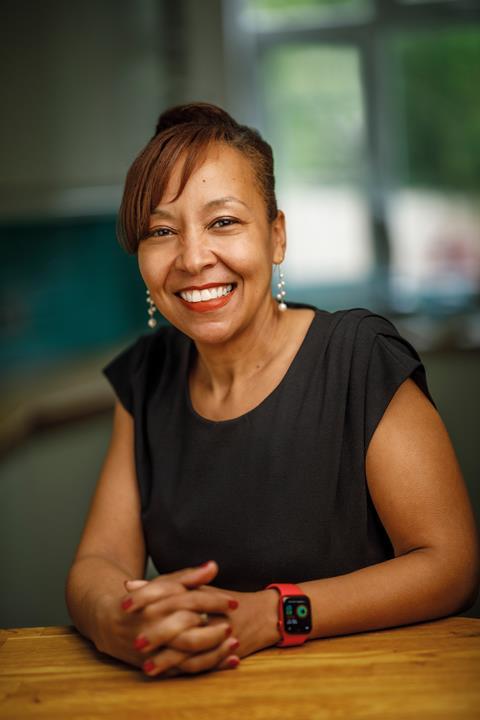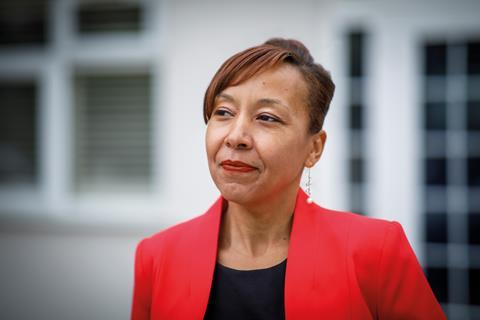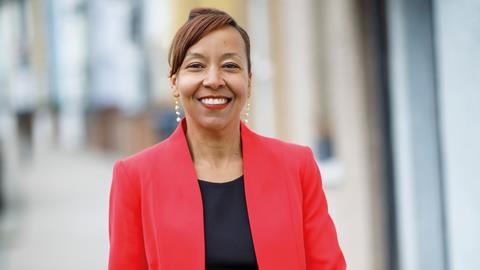Rachel McKoy, president of Lawyers in Local Government, shares her passion for the ‘tapestry’ of planning and constitutional law, community and public service with Eduardo Reyes
BIOG
BORN
Clapham, south London
EDUCATION
Virgo Fidelis Girls School
University of Westminster
ROLES
Constitutional support officer, Southwark Council (2000-2003); trainee solicitor, Buckinghamshire County Council (2003-2005); senior planning solicitor, Southwark Council (2005-2015); assistant borough solicitor, Bracknell Forest Council (2015-17); Government Legal Department, Department for Transport (2017-19); head of commercial and contracts, London Borough of Tower Hamlets (2019-21); director of law and governance (monitoring officer), London Borough of Hounslow (2021-present)
KNOWN FOR
President, Lawyers in Local Government; non-executive director, Society of Local Authority Chief Executives
Baroness Scotland KC was not Rachel McKoy’s only lawyerly role model. The other was Rumpole of the Bailey. Rumpole, the fictional creation of barrister and writer John Mortimer, piqued her curiosity. The Rumpole stories conveyed the ‘theatre’ of the court and prompted questions. ‘What is all of that about? And what happens? I was quite fascinated,’ she says. A more general interest in law took hold in her teenage years. But Scotland – the first black woman to take silk, lead a chambers and become attorney general – was an important and highly visible role model. Scotland took her responsibility as a role model seriously, writing and speaking in public regularly.
That had an effect, McKoy recalls: ‘I just thought, wow, this amazing woman, also a woman of colour, from the Caribbean as well, that’s my heritage also… she’s just absolutely trailblazing. I thought, if you can see it, you can be it. It really inspired me.’
McKoy, now president of the professional association Lawyers in Local Government (LLG), and director of law and governance (monitoring officer) at the London Borough of Hounslow, did not take a simple path to fulfil her legal career ambition.
She started on a legal executive route to qualification, working at Islington Council. But at 19 she had a son – ‘a defining moment’, she reflects. ‘Some people said, “Oh, that’s it, you’re written off.” And I was just like, “There are two things: don’t tell me no; and don’t say I can’t do something.”
‘You know what,’ she recalls thinking, ‘I’m going to do the conventional route. And I did. I did the law degree and went through that route.’
Graduating from the University of Westminster in 2000 (receiving her degree certificate from the hands of Baroness Scotland), she took a job at Southwark Council working on constitutional support. It was a time of change in local government, she remembers: ‘The Local Government Act 2000 just came in and it was the abandonment… of the old committee system.’
It also put in place new executive arrangements. McKoy says her ‘first proper job was amazing because it was a step into that constitutional, political space, [and] the legal elements … and I enjoy that interplay – with politicians, and also serving communities’.
But it was not a route to qualification and she needed a training contract. Like a south London bus, two offers came at once – one at Gravesham Borough Council in Kent, the other from Buckinghamshire County Council. She admits to having had a ‘romantic notion’ about the ‘grandeur’ of Buckinghamshire. ‘I’ll commute every day down to Buckinghamshire,’ she decided. It was a ‘logistical nightmare’, not least with a young child, but one she made work. (Her son is now a corporate lawyer at Clifford Chance.)
'Planning is a magnificent area of law, of practice. Because you work on the policies, you work on the gestation of change, and then you see it… a tangible result at the end of it. I’m fascinated by the change you can make'
McKoy’s final seat was in planning. ‘That’s where the love of planning began,’ she says. ‘I had a big bypass inquiry which was fascinating because it was so controversial.’ Through the four-week inquiry, she ‘really got stuck into all aspects of it’. The ‘tapestry’ of community concerns, opposing parties, and the council’s own aspirations for the plans thoroughly appealed.
‘Planning is a magnificent area of law, of practice,’ she continues. ‘Because you work on the policies, you work on the gestation of change, and then you see it… a tangible result at the end of it. I’m fascinated by the change you can make – real change in real communities. Because if you can get good-quality housing schemes that people are really proud of, it brings in investment, it regenerates an area, brings more green spaces, more love into communities, and through that they just grow, they blossom. I’ve seen it time and time again in the different authorities where I’ve worked… it’s a wonderful legacy just to say, “I was part of that, I negotiated that”. It’s something quite magical.’
As senior planning solicitor at Southwark, she worked at the central and inner London borough during a time of rapid change and development. ‘If you know all around Borough and London Bridge, what it used to be like, and then down on that side of Elephant and Castle, entering into Camberwell, it’s [now] the new urban quarter, isn’t it?’ she enthuses.

In-house lawyers commonly have to move employer for wider experience and career advancement – even a large in-house department can be small by law firm standards. After two years at Bracknell Forest Council, McKoy became a government lawyer at the Department for Transport, working in a rail and road major projects team.
‘I was able to work on HS2… Phase 2B, and some of Phase 2A as well,’ she recalls. Plans were also being drawn up for the ‘Ox-Cam Arc’, to improve development and infrastructure between Oxford and Cambridge. This aims to boost what is increasingly known in the technology, finance and biotech worlds as the ‘golden triangle’, driven by the interactions of Oxford, Cambridge and London on finance and innovation.
McKoy was involved on some of the discretionary decisions to be taken on HS2 where ministers could decide on ‘special arrangements’. Some showed compassion to the individual circumstances of people affected by the project. For example, someone with a terminal illness who needed to downsize and move, but who was technically outside of a compensation scheme and was therefore stuck.
In the end, though, she reflected that working for central government means ‘you just don’t have the level of autonomy’ that local government provides. ‘In local government,’ McKoy notes, ‘you’re just so much closer to the politicians… in the room with your corporate leadership team, making it happen.’
She moved to Tower Hamlets, where she worked on commercial contracts and procurement. One standout event was a threatened judicial review, ‘taking the government to task, basically challenging it on the grounds of bias’ over the decision of secretary of state Robert Jenrick to pass a controversial planning application, against advice.
The application for the Westferry Printworks site was for 1,500 homes, backed by a company controlled by Conservative party donor Richard Desmond. Original permission was granted in time for the company, Mace Developments, to avoid £40m-£60m that would have been due through the new infrastructure levy. Jenrick, who had been in direct contact with Desmond, then quashed his own decision, avoiding the requirement to produce documentation to the High Court. (Any wrongdoing was denied by Jenrick.)
The episode shows the tensions at play in local authority planning. Tower Hamlets has the highest poverty rates of the London boroughs, but is also home to Canary Wharf and facing huge development pressures. It includes parts of central and inner London, but for many residents the infrastructure requires key improvements. Housing is needed but social housing is not a developer priority. And on the Westferry site there were political pressures, both local and national.
Law and governance can give a structure to resolving those tensions. In the case of Tower Hamlets, legal action ensured the site would not be developed without an infrastructure levy being paid.
Community minded
Rachel McKoy relates a close involvement with her own community, in South Norwood in the London borough of Croydon. ‘We Love SE25’ is an umbrella group that brings together community groups, charities and faith organisations. ‘Everyone’s invited,’ she says. One task was to write an economic development plan that would unlock funding for the community from the Greater London Authority. Activities include making small awards to local projects that need sums such as £500 to get an idea off the ground.
One project benefiting is the South Norwood Community Kitchen, which McKoy ran in aid of at this year’s London Marathon. Community kitchen volunteers cook meals for ‘anyone who comes’, up to 250 a week. ‘You could be homeless, you could be newly arrived families that are really struggling,’ she says. The project grows some of the food it serves.
Public funds for community projects have been cut and money remain tights, McKoy says. But, she concludes, people who can help should still ask: ‘What’s your service… to humanity? You should want to do something.’
McKoy is now director of law and governance at Hounslow, which includes the important ‘monitoring officer’ role. It is a wide brief which includes the ability to manage relationships between officers and elected members, something she stresses has been important in all her previous roles. But she is also, crucially, the ‘custodian’ of the council’s constitution. McKoy is tasked with ‘ensuring the lawfulness and robustness of good governance and decision-making, through all our executive arrangements and other committees’. That includes managing controversial investigations into any of the council’s 62 elected councillors if they face accusations of code of conduct breaches. She recognises elected office as ‘a really, really tough gig’, and notes that good support also needs to be built into any process for councillors.
The ‘custodian’ role is anything but abstract. The discussion turns to Croydon Council, now in financial crisis. Senior officers and members of the executive were the subject of a damning ‘public interest report’ by accountants Grant Thornton in October 2020. The council’s current executive mayor Jason Perry says: ‘The scale and severity of Croydon’s financial collapse is unprecedented.’
'In local government you’re so much closer to the politicians… in the room with your corporate leadership team, making it happen'
Grant Thornton had found ‘collective corporate blindness to both the seriousness of the financial position and the urgency with which actions needed to be taken’. This included evidence of council loans being used to make disastrous commercial investments.
Where the position of councils such as Croydon have been the subject of public interest reports, McKoy says these have highlighted ‘really bad relationships between officers and members – toxic environments, where the key people are not in the right spaces’.
LLG’s work here has emphasised the importance of what it terms ‘the golden triangle’ – the relationship between the chief executive, the chief finance officer and the monitoring officer. Regular meetings between the three are important, McKoy says: ‘You sit down, you can talk about the risks, you can talk about what’s happening with all of those spaces… a lot of the instances where the government’s had to step in is where that has fallen away.’
In ‘toxic cultures’, she adds, there is a tendency to think: ‘We’ll keep the lawyer out of it… the monitoring officer is literally cut out of the loop… and if you’re just not invited, then I don’t know how you’re going to know what’s going on.’
A monitoring officer therefore finds their resilience tested. The challenge for LLG, McKoy says, is to identify how to ‘bolster our people to be able to have the skills and confidence to know what they’re looking for – those warning signs’.

To support them, LLG has a ‘monitoring officer defence scheme’, to provide mentoring and supportive contacts, recognising ‘it can be a really lonely place, actually, as monitoring officer’.
‘If you make a call,’ she says, ‘it could be [something] like a standards investigation, it could be against a leader of the council, or some cabinet member… then you can just have a whole campaign against you, at the political level, that makes it really spiky and difficult.’
Significant sums of money can be at stake. ‘Local government councils are big business,’ McKoy points out. ‘Millions and millions of pounds in transactions, massive schemes, if you think about all those IT contracts… regeneration… where the will to get it done is so strong that’s it’s just like nothing’s going to stand in the way of this project being delivered.’
The task for LLG, she says, is to ‘help build resilience and shine a light on what best practice looks like’.
I ask about an area where local government has widespread failings – special educational needs provision and, linked to that, social services. Local authorities lose more than nine in 10 of all cases at the SEND Tribunal. Estimates of local authority legal spend at the tribunal is £100m a year.
McKoy (not referring to a specific council) answers: ‘I think what’s probably happening in those areas is maybe the client departments are just taking a bit more of the lead than maybe they should. They’re just running … the cases themselves... I don’t know if then it’s only the escalated ones [which] the lawyers see… but we do know that childcare lawyers, and adult social care lawyers, are really a rare breed to find.’
In the context of a recruitment and retention problem in local government work, locums are used. She says this is not ideal. ‘Tribunal appeal processes are there to shine a light on where things are going wrong.’ But she adds: ‘There’s just not enough of us really.’
McKoy says LLG is working hard to improve knowledge of local government legal careers, making the case to a new generation of lawyers that the ‘tapestry’ of challenges that attracted her to local government – and kept her there – should be their ambition as well.
Photographs by Darren Filkins





































No comments yet